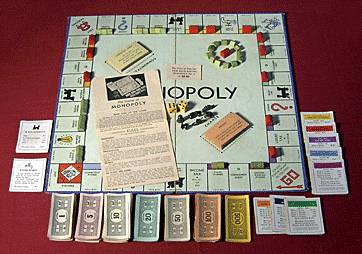
If you’ve ever played Monopoly, you know that it can often take hours at a time and can seem to go nowhere until someone gets lucky. However, there is also a good chance that the game itself isn’t to blame for this. In fact, the common house rules for Monopoly actually make the game less fun and less strategic, turning a game about intense bidding and strategic buying into one where the dice decide everything.
And yes, thereis bidding in Monopoly. One of the most forgotten rules is that  when you land on a space and decide to not buy it, itmust go up for auction starting at $1. This means that when you land on even the least useful of properties, you and all of the other players have the opportunity to get it for less than the board’s stated price. On the other hand, a more contested space (such as the straight between jail and free parking) could end up rising astronomically in price if the person who lands on it can’t afford the property right away. This rule allows for actual strategy in a game that’s infamous for not having it and speeds up the game immensely since all of the properties are bought up more quickly. Remembering this auctioning rule can also help to stimulate trades, since you can buy a property at a low price at auction, then sell it for its normal price to make a profit off of another player who wanted it.
when you land on a space and decide to not buy it, itmust go up for auction starting at $1. This means that when you land on even the least useful of properties, you and all of the other players have the opportunity to get it for less than the board’s stated price. On the other hand, a more contested space (such as the straight between jail and free parking) could end up rising astronomically in price if the person who lands on it can’t afford the property right away. This rule allows for actual strategy in a game that’s infamous for not having it and speeds up the game immensely since all of the properties are bought up more quickly. Remembering this auctioning rule can also help to stimulate trades, since you can buy a property at a low price at auction, then sell it for its normal price to make a profit off of another player who wanted it.
Now that the game has strategy again, let’s deal with the issue of game length. Free parking is a space which many use as a sort of jackpot, having whoever lands on it gain all of the recently spent tax money. In reality, Monopoly’s actual rules say nothing about this jackpot, since free parking is meant to be just that: a blank space.  The whole reason the tax spaces and cards exist is to speed up the game by bringing players closer to bankruptcy, so bringing that would-be dead money back into circulation slows the game to a halt, since suddenly whoever landed on free parking gains a load of cash that will need to be taken back out of the game in order for them to lose.
The whole reason the tax spaces and cards exist is to speed up the game by bringing players closer to bankruptcy, so bringing that would-be dead money back into circulation slows the game to a halt, since suddenly whoever landed on free parking gains a load of cash that will need to be taken back out of the game in order for them to lose.
Of course, there are other house rules that mess with the game’s balancing, but those two are the biggest time wasters as well as the least known rules. With just two changes, Monopoly can switch from being the bane of family reunions that crawls on for three or four hours to an intense battle of bidding, trading, and tax management. A game is carefully balanced and designed with the rules in mind, and Monopoly shows that breaking them can really break the experience as well.
that crawls on for three or four hours to an intense battle of bidding, trading, and tax management. A game is carefully balanced and designed with the rules in mind, and Monopoly shows that breaking them can really break the experience as well.
Leave a comment (all fields required)
Comments will be approved before showing up.

